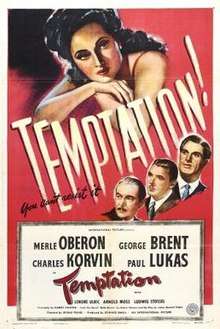Temptation (1946 film)
Temptation is a 1946 American film noir thriller film directed by Irving Pichel and starring Merle Oberon, George Brent, Charles Korvin and Paul Lukas. The film was based on Robert Smythe Hichens's 1909 novel Bella Donna.[2]
| Temptation | |
|---|---|
 Theatrical release poster | |
| Directed by | Irving Pichel |
| Produced by | Edward Small |
| Screenplay by | Robert Thoeren |
| Based on | Novel: Bella Donna by Robert Smythe Hichens Play: Bella Donna by James B. Fagan |
| Starring | Merle Oberon George Brent Charles Korvin Paul Lukas |
| Music by | Daniele Amfitheatrof |
| Cinematography | Lucien Ballard |
| Edited by | Ernest J. Nims |
Production company | |
| Distributed by | Universal Pictures |
Release date |
|
Running time | 99 minutes |
| Country | United States |
| Language | English |
| Budget | $1.6 million[1] |
The 1923 film Bella Donna, starring Pola Negri, which was directed by George Fitzmaurice[3] is also based on that novel. Other versions were filmed in 1915 and 1934.
Plot
Victorian melodrama, set in Egypt, where a down-on-her-luck courtesan (Oberon) snares a loving but naive Egyptologist (Brent), marries him and moves to Egypt. She quickly becomes bored and embarks on an affair with Mamhoud Baroudi (Korvin). She falls in love with him, and together, they plot to do away with her husband.
Cast
- Merle Oberon as Ruby
- George Brent as Nigel Armine
- Charles Korvin as Mahoud Baroudi
- Paul Lukas as Sir Meyer Isaacson
- Lenore Ulric as Marie
- Arnold Moss as Ahmed Effendi
- Robert Capa as Hamza
- Aubrey Mather as Dr. Harding
- Ludwig Stössel as Dr. Mueller
- André Charlot as Prof. Dupont
- Suzanne Cloutier as Yvonne Dupont
- Gloria Lloyd as Jean McCormick
Production
The film was the first producer Edward Small had made away from United Artists for a number of years.[4] He bought the rights to the novel in 1941 intending to make it as a vehicle for Ilona Massey who had just made International Lady for him.[5][6] He intended to make the film for United Artists but other projects took priority. Over a five-year period there were several near-starts and postponements; he almost managed to begin production in February 1946 but there was not enough studio space. Small's deal with United Artists expired so the film became the first shot at Universal by International under the new United World Pictures arrangement.[1]
Reception
Film critic Bosley Crowther panned the film when it was released, writing "True enough, Miss Oberon looks lovely, Mr. Korvin behaves with bold sang-froid and George Brent is sufficiently unimpressive to seem a husband that a dame would double-cross. Paul Lucas, Arnold Moss and Lenore Ulric also act as though they thought they had a script. But the whole thing is as claptrap in its nature as it was when Pola Negri played it back in 1923."[7]
Variety magazine panned the screenplay, writing "Production is well-stacked with solid values in every department except for the screenplay, which falls short in its attempt to stretch an unsubstantial story line over so long a running time."[8]
References
- Meets Girl By FRED STANLEY (May 5, 1946). "THE HOLLYWOOD WIRE: In the Clear MORE HOLLYWOOD ITEMS". New York Times. p. X1.
- Temptation on IMDb.
- Bella Donna on IMDb
- "MICHAEL TODD SET TO FILM 'GREAT SON': Ferber Novel Will Be His First Universal Picture--Hellinger Acquires 'Criss-Cross' "Variety Girl" Planned". New York Times. June 4, 1946. p. 33.
- "The THEATRE: Entertainment NotesZwork=Wall Street Journal". July 3, 1941. p. 13.
- DOUGLAS W. CHURCHILL (July 1, 1941). "SCREEN NEWS HERE AND IN HOLLYWOOD: Monty Woolley to Repeat His Role in 'The Man Who Came to Dinner' for Warners PICTURE TO BE HELD OVER ' Blossoms in the Dust' to Run Second Week at Music Hall -- French Films Revived". New York Times. p. 27.
- Crowther, Bosley. The New York Times, film review, December 25, 1946. Last accessed: February 25, 2011.
- Variety, film review, December 2, 1946. Last accessed: February 25, 2011.
External links
- Temptation on IMDb
- Temptation at AllMovie
- Temptation at the TCM Movie Database